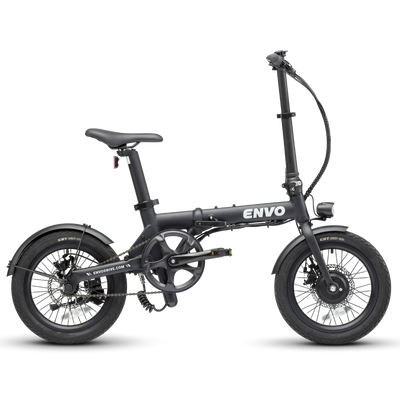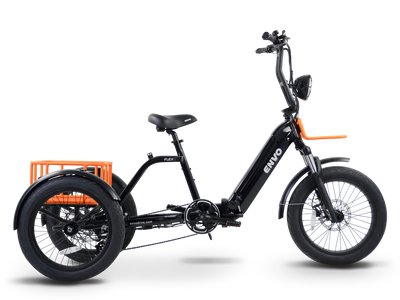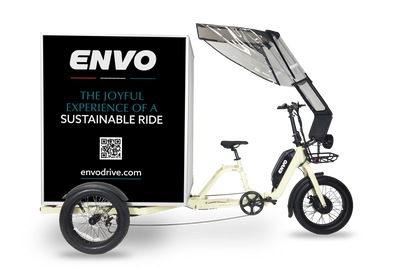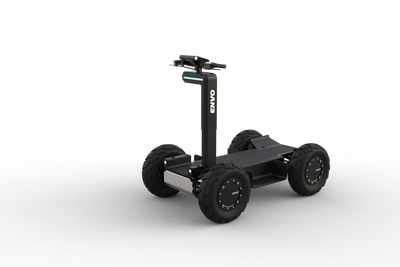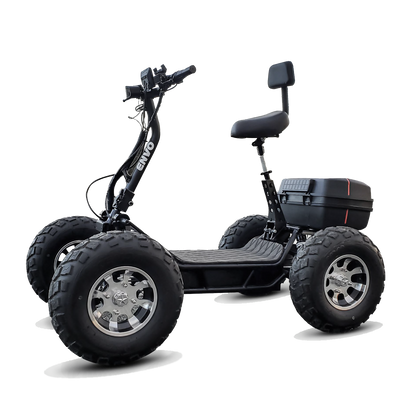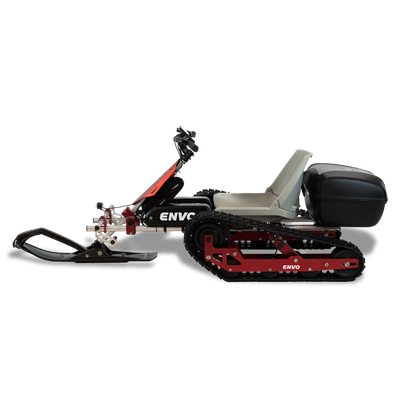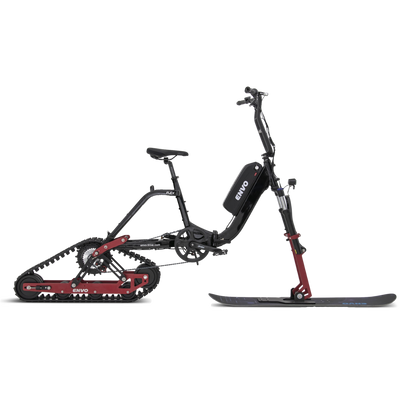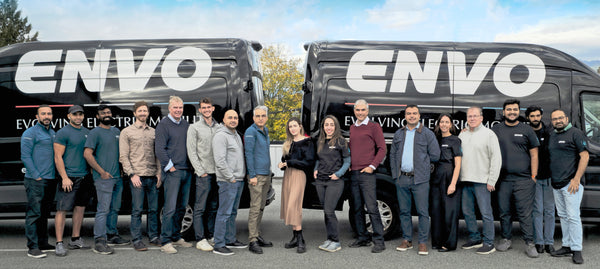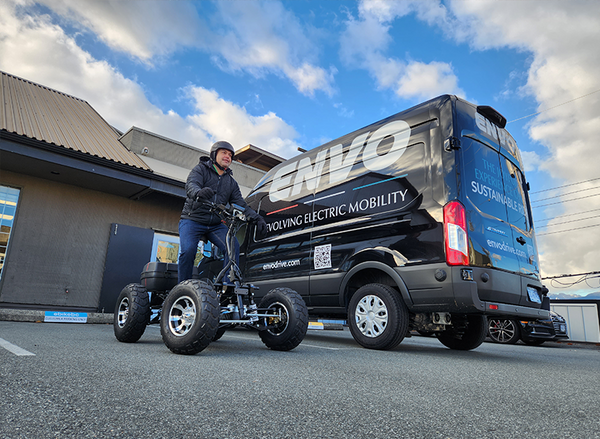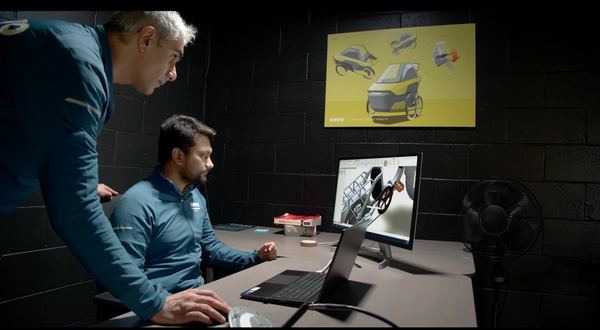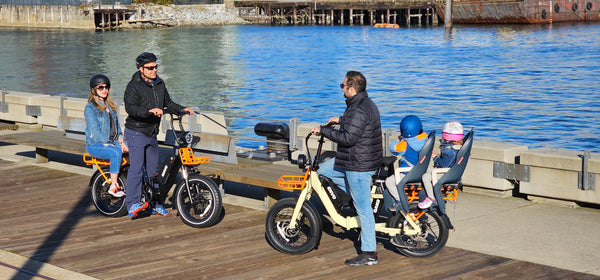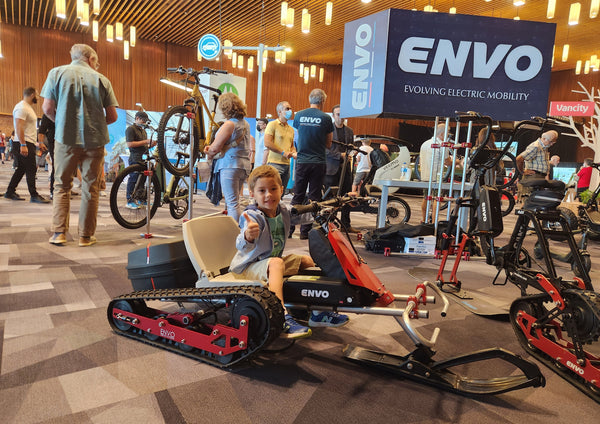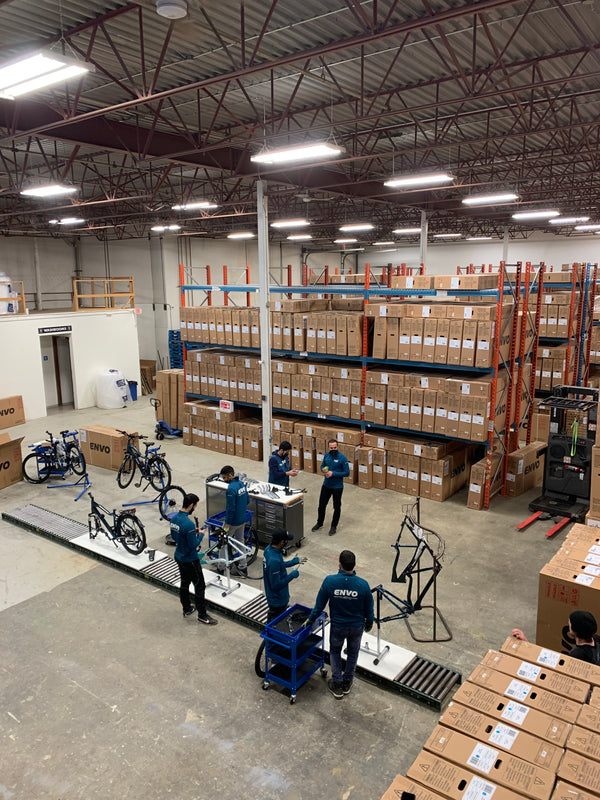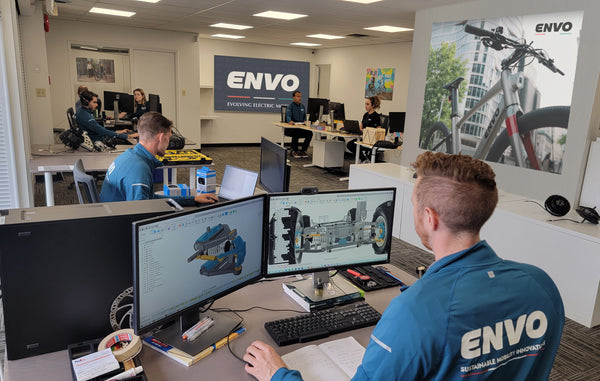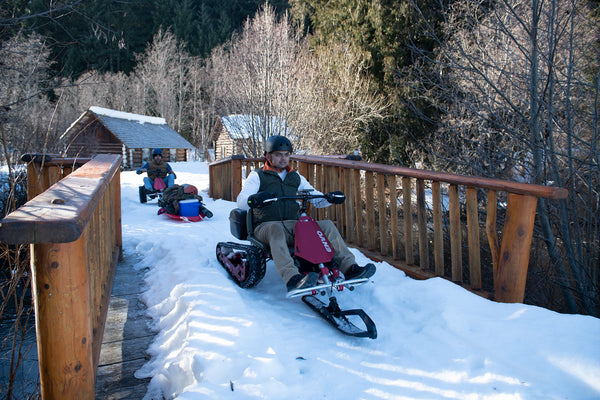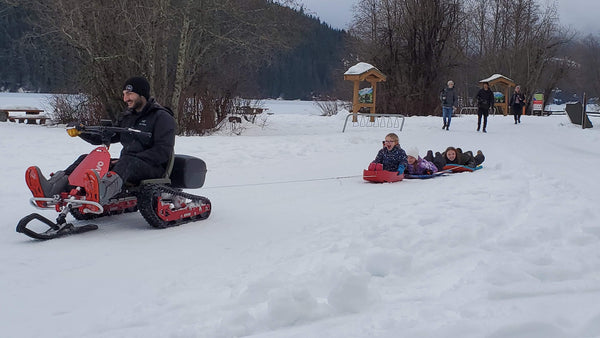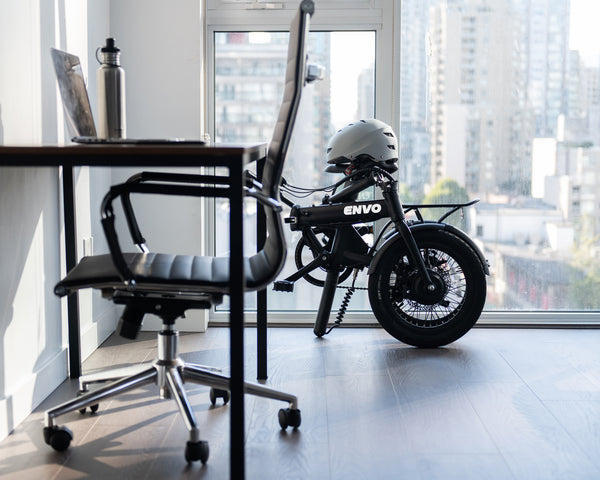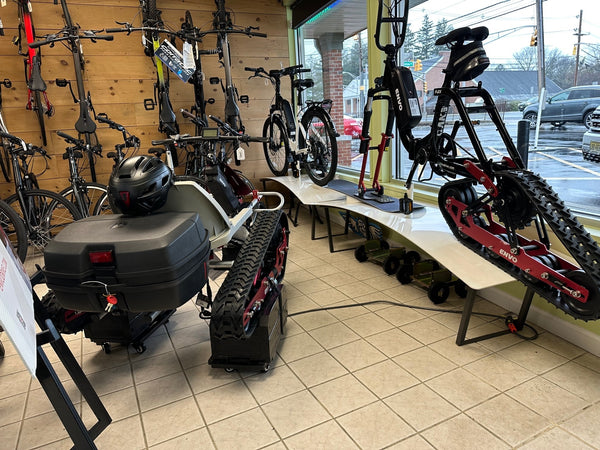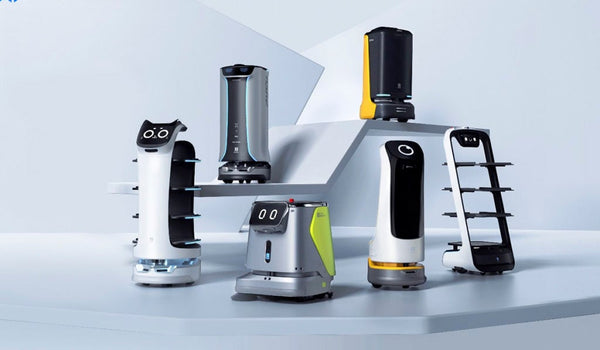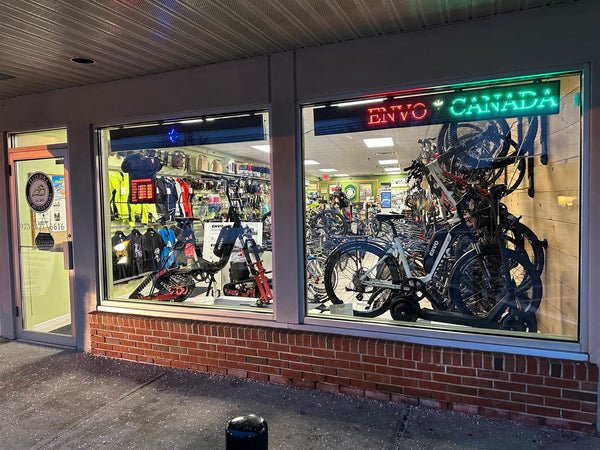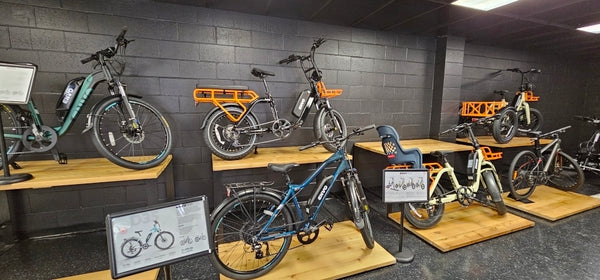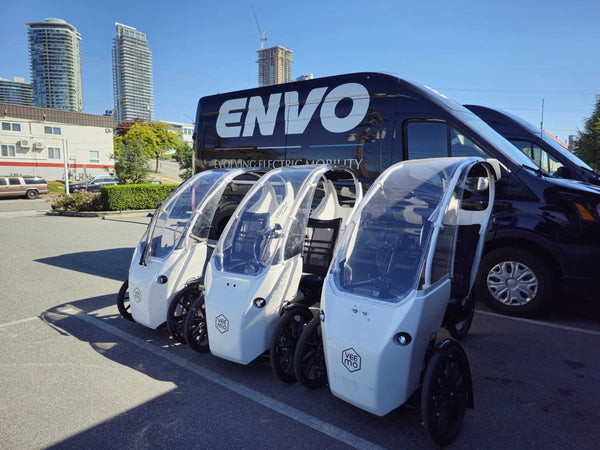At ENVO, our passion for innovation and sustainability drives us to push the boundaries of electric mobility. Our latest project, the Utility Personal Transporter (UPT), is a testament to this commitment. Let's take a quick journey through its development so far.
The Adventure Begins: Digital Simulations
Our journey started with digital simulations. Picture our engineers, huddled over computers, using advanced software to predict how the UPT would perform in various conditions. These simulations were like a crystal ball, helping us spot potential issues early and ensuring the design was perfect before we even built a prototype.
Bringing Ideas to Life: Real-World Testing
Next, we moved from the digital world to reality. We built prototypes and put them through rigorous real-world tests. This phase was all about seeing how our theoretical predictions held up in everyday situations. It was exciting to watch the UPT come to life and perform as we hoped.
Refining the Vision: Design Iterations
The real-world tests gave us valuable insights, leading to continuous design improvements. Our team went back to the drawing board (well, CAD software) to tweak and refine the design. This iterative process ensured the UPT met our high standards for performance, safety, and user experience.
Gearing Up for Production: Main Chassis Design Freeze
With a polished design, we were ready to move into production. We finalized the main chassis design and started manufacturing key components. Using aluminum extrusions for the frame allowed for great flexibility and easy assembly, reducing the number of parts needed.
Adding the Final Touches: Design and Technology
We then focused on the finishing touches. Our industrial design team selected paint colors and materials to ensure the UPT looked as good as it performed. Meanwhile, our electrical engineers worked on the Vehicle Control Unit, adding new functions to enhance the UPT's capabilities.
Now, we're designing plastic molds for in-house thermoforming to produce durable, high-quality components. Managing this process internally ensures every UPT meets our exacting standards.
-------
To keep you in the loop, we're launching a series of weekly update blogs. Join us as we continue this exciting journey, sharing our progress, challenges, and achievements in bringing the ENVO UPT to life.
---
Development Process
Ideation:

The development of the UPT began with a critical ideation phase. During this stage, our engineering team convened to brainstorm and compile a comprehensive list of requirements for the vehicle. This "wishlist" served as the guiding vision, outlining the desired features, performance specifications, and user experience goals. It was crucial in setting the direction for the entire project.
Industrial Design:
With a clear vision in place, the next step was to translate these ideas into a tangible form through industrial design. The team created a 3D model of the UPT, which underwent numerous iterations to refine its aesthetics and functionality. The final design was chosen not just for its practicality but for its modern, sleek look, drawing inspiration from consumer electronics to appeal to a contemporary audience.
Design Iteration 1:

Final Design:

Engineering Design:
Once the industrial design was finalized, the focus shifted to engineering. This phase involved the creation of detailed 3D models and engineering drawings. The team meticulously developed hundreds of individual 3D parts and thousands of technical drawings, ensuring that every component was optimized for manufacturing. The goal was to bridge the gap between design and production, making sure the UPT was ready for mass production without compromising on quality or functionality.

Prototype Production:
With the design fully realized, the production phase began. Partner manufacturing plants were engaged to produce the necessary parts, utilizing techniques such as aluminium extrusion, sheet metal fabrication, and CNC machining. This phase was critical in transforming the virtual models into physical components, laying the groundwork for the assembly of the first UPT units. Each part was crafted with precision to meet the high standards set during the design process, ensuring that the final product would meet customer expectations.

---

ENVO UPT Weekly R&D and Production Report: Week 1
Welcome to the first installment of our weekly update series on the R&D and production process of the ENVO Utility Personal Transporter (UPT)! We are excited to share the progress and give you a behind-the-scenes look at how we’re bringing this innovative mobility platform to life.
Assembling the First Prototypes
This week marked the beginning of a significant milestone for us: the assembly of the first six prototypes of the ENVO UPT. These prototypes will help us fine-tune our design and production processes to ensure that the final product exceeds expectations.
Highlights of the Week
1. Receiving and Organizing Parts:
We received parts from our suppliers and carefully sorted and organized them at our assembly location. 
2. Setting Up Workstations:
We set up and optimized our workstations, ensuring a smooth and efficient assembly process.
3. Tool and Equipment Sourcing:
Our team acquired the necessary tools and equipment and established CNC and cutting stations.
4. Assembly and Testing:
- Tested the assembly of key components like the steering column and linkage.
- Produced and tested jigs and molds for cutting and drilling operations.
5. Quality Control:
We conducted thorough quality checks on all parts and ensured they fit perfectly.
6. Subassemblies and Mounting:
- Prepared and mounted the battery connectors and controller mounting holes.
- Assembled the suspension systems on the prototypes.
7. Collaboration and Problem-Solving:
Our team worked together to address any challenges and refine our processes, ensuring everything runs smoothly.
Looking Ahead
Next week, we plan to continue with the assembly process, focusing on fine-tuning the prototypes and resolving any issues that arise. Our goal is to ensure that each component is perfectly integrated, paving the way for a seamless production phase.
Stay tuned for more updates as we move closer to bringing the ENVO UPT to market. We appreciate your support and enthusiasm for our innovative mobility solutions.
ENVO UPT: Week 2 Update - Building Momentum
Another week of progress has flown by as our team continues to refine the ENVO UPT prototypes. We're excited to share the latest developments in our journey towards creating a revolutionary mobility platform.
Focus on Fine-Tuning
This week has been centered around refining various components and systems. Our team has been hard at work on:
-
Mold: We’ve made significant strides in improving the fender molds, addressing fitment issues and ensuring optimal part quality.
-
Electrical Systems: Wiring harnesses for lights, controllers, and handlebars are progressing, bringing the UPT closer to functionality.
-
Component Assembly: Motors, suspension components, and other key parts are being assembled with meticulous attention to detail.
-
Problem-Solving: We've encountered and overcome several challenges, including plastic molding issues and fender/bumper installation difficulties.
-
Future Applications: Exploring potential partnerships with organizations like the wildfire team is an exciting step towards expanding the UPT's capabilities.
While there's still much work to be done, we're encouraged by the progress made and the dedication of our team. Every challenge brings us closer to realizing our vision for the ENVO UPT.
We'll continue to provide updates as we move closer to completing the initial prototypes. Your support and enthusiasm fuel our drive to create a truly exceptional mobility solution.
ENVO UPT: Week 3 Update - Pushing the Boundaries
As another week wraps up, the momentum behind our ENVO UPT prototypes continues to build. We're thrilled to bring you the latest updates on our progress as we edge closer to completing this groundbreaking mobility platform.
Fine-Tuning and Troubleshooting This week was all about precision and problem-solving. Our team tackled several key areas to ensure the ENVO UPT is up and ready.
-
Steering Linkage: We identified a challenge with the steering linkage and quickly developed a solution by adding spacers, ensuring smooth and accurate steering for a better user experience.
-
Mold Production: Our efforts to perfect the fender molds continued, with bondo and sanding sessions getting the final fender molds ready for production. This work is crucial to achieving the high-quality finish and durability we aim for in every component.
-
Vacuum Forming: We initiated the vacuum forming process, a significant step in producing precise and durable parts that meet our rigorous standards.
Synchronization and Electrical Integration Synchronization and integration are key to the seamless operation of the UPT, and this week saw major progress in these areas.
-
Motor Synchronization (PID): We successfully synchronized all motors using PID control, ensuring they spin at the same RPM. This achievement is critical for the smooth and efficient performance of the UPT.
-
Handlebar Controls: The wiring and testing of handlebar controls moved forward, bringing several features online:
-
Turn signals and hazards for enhanced safety.
-
ON/OFF functionality, headlights, horn, and Electric Parking Brake.
-
Throttle and forward/reverse controls, ensuring smooth operation.
Assembly and Component Fabrication With the core systems coming together, attention turned to assembling and fabricating the UPT’s structural components.
-
Fenders and Bumpers: The rear fenders were formed and cut, and we began CNC machining for the EPP bumpers. These components are vital for both the functionality and aesthetics of the UPT.
-
Suspension Systems: We made strides in building the double-wide suspension and completed key stages in the gokart suspension assembly. These steps are crucial to ensuring the UPT delivers a smooth ride across various terrains.
Final Adjustments and Wiring As we near the completion of the initial prototypes, final adjustments and wiring are critical.
-
Battery Setup: We hooked up the batteries, carefully ensuring all are at the same voltage, which is essential for consistent power delivery and reliability.
-
Electrical System: The team focused on cleaning up wiring and integrating systems like the brake lights and VCU (Vehicle Control Unit) wiring, ensuring all elements work seamlessly together.
-
As we dive into Week 4 of the ENVO UPT prototype development, the finish line is beginning to come into view. Our team has been working tirelessly to bring all the components together, solving critical challenges and making significant strides towards the completion of the first prototypes. Here’s what we’ve been up to this week:
Prototyping and Testing
This week, our focus was on refining and testing various aspects of the ENVO UPT to ensure everything operates seamlessly together.
-
Golf Cart Bench Seat Mockup: We successfully built a mockup of the golf cart bench seat, a crucial step in ensuring both comfort and functionality in the final product.
-
Motor Testing on Gokart version: We tested the motor functionality on the gokart version, running all motors simultaneously to ensure they perform as expected under load.
-
Lighting Systems: A critical update was made to the lighting systems—lights can now be turned on and off independently of the UPT’s power state. This change will help conserve battery life and improve user control.
-
Wiring Harness: Our new wiring harness underwent rigorous testing this week. It’s a vital component that connects all the UPT’s systems, and ensuring its reliability is key to the overall functionality.
Problem-Solving and Final Modifications
Every week brings its own set of challenges, and Week 4 was no different. Here’s how we tackled them:
-
CAN Communication Error: We resolved a CAN communication error that was affecting system integration, a critical fix for ensuring smooth operation across all systems.
-
EPP Bumper Production: We encountered an alignment issue when flipping the EPP bumper on the CNC, but we’re actively working on a solution. Despite this, we’ve made progress, with 3 out of 5 bumpers completed. Next up is the double-wide bumper for the UTV, which Sam is spearheading.
Assembly and Integration
With parts coming together, we’ve been focused on key assembly tasks this week:
-
Motor Installation on Essential UPT: The motors were successfully installed on the Essential UPT, marking a significant milestone in the build process.
-
Steering and Brake Systems: Steering has been installed across all UPT prototypes, and we’ve begun routing brake lines—a critical step for safety and control.
-
Fender Production: We’ve started forming the front left fenders, with more to follow as we work through the production queue.
-
Shock Mounts & Suspension: After grinding the shock mounts, we reinstalled the suspension, further advancing the UPT’s assembly.
Final Touches
-
Loctite & Torque: We’ve applied Loctite and torqued all bolts on the golf cart, ensuring everything is secure and ready for use.
-
Bumper Design and Cleaning: Work continues on the design for the double-wide bumpers, and we’ve been cleaning and reassembling bumpers to ensure they meet our quality standards.
-
CANbus Code and Harnesses: We’re currently assembling parts to send to Mas for harness production. Once the harnesses are completed, we’ll finalize the CANbus code for both the display and controllers, with Danial leading the effort on the general code.
-
-----------
Week 5
This week has been a whirlwind of activity as we continue to push forward with the development of our Utility Personal Transport (UPT) project. Each task is a step closer to bringing this innovative vehicle to life, and the team's progress has been remarkable. Here's a detailed update on what we've accomplished this week:
Bumper Development & Finishing
Our focus on refining the UPT’s bumpers has seen significant strides. The team has been experimenting with different finishes on the EPP bumpers, sanding them down to achieve the perfect texture and durability. We're close to finalizing a finish that not only looks good but also provides the necessary protection. Concurrently, we’ve been working on forming and cutting fenders, with the front right fender near completion.
GoKart Version Enhancements
A lot of attention has been directed towards our GoKart variant this week. We tested the motor functionality across all units simultaneously, ensuring that every component is operating smoothly. In addition, we’ve successfully installed the steering column, which will enhance handling and overall user experience. We also tackled the critical task of establishing CAN communication from the display to the controller, which allowed us to test the electric parking brake. This is a crucial safety feature, and we're pleased to report that the initial tests have been successful.
Mechanical Adjustments & CNC Work
Our mechanical team has been busy with several essential tasks. We’ve trimmed aluminum extrusions for the bumpers and fixed the alignment of the suspension on the golf cart, improving both performance and ride comfort. The CNC machines were set up to begin cutting the double-wide bumpers, and we’ve made progress in forming and cutting the consoles, with 6/6 consoles formed and 4/6 cut. Additionally, holes were cut into consoles, and the design and cutting of 2D plastics are nearing completion, further streamlining our production process.
Suspension and Brake System Overhaul
Fine-tuning the suspension on our UTVs has been a priority, particularly addressing a softness in the rear left suspension. Adjustments were made to the GoKart shock mounts to improve stability. In terms of safety, we've routed the brake lines on the standard UPT model and bled the brakes across all units to ensure optimal performance. This meticulous attention to detail is crucial as we edge closer to testing the UPT in more demanding conditions.
Design Innovations
In parallel with our mechanical work, design efforts have continued to flourish. The GoKart's roof supports were bent into shape, and we’ve made progress on designing the roof rests with cutouts for lights, an important feature for visibility and style. We're also working on the snowplow attachment, which will add significant utility to the UPT, especially in winter conditions.
Interior Comfort & Customization
We haven't overlooked the comfort of our UPT users. This week, we began building seat cushions, starting with the purchase of designed foam. We’re also in the process of designing an EPP part to support the cushion and wrapping it in neoprene for a sleek, durable finish. This is part of our ongoing effort to ensure that every ride in the UPT is as comfortable as it is efficient.







